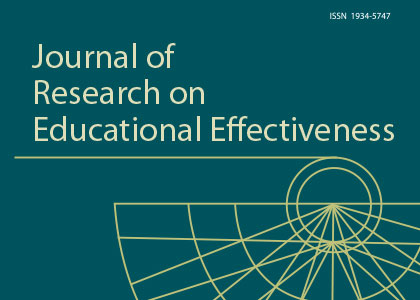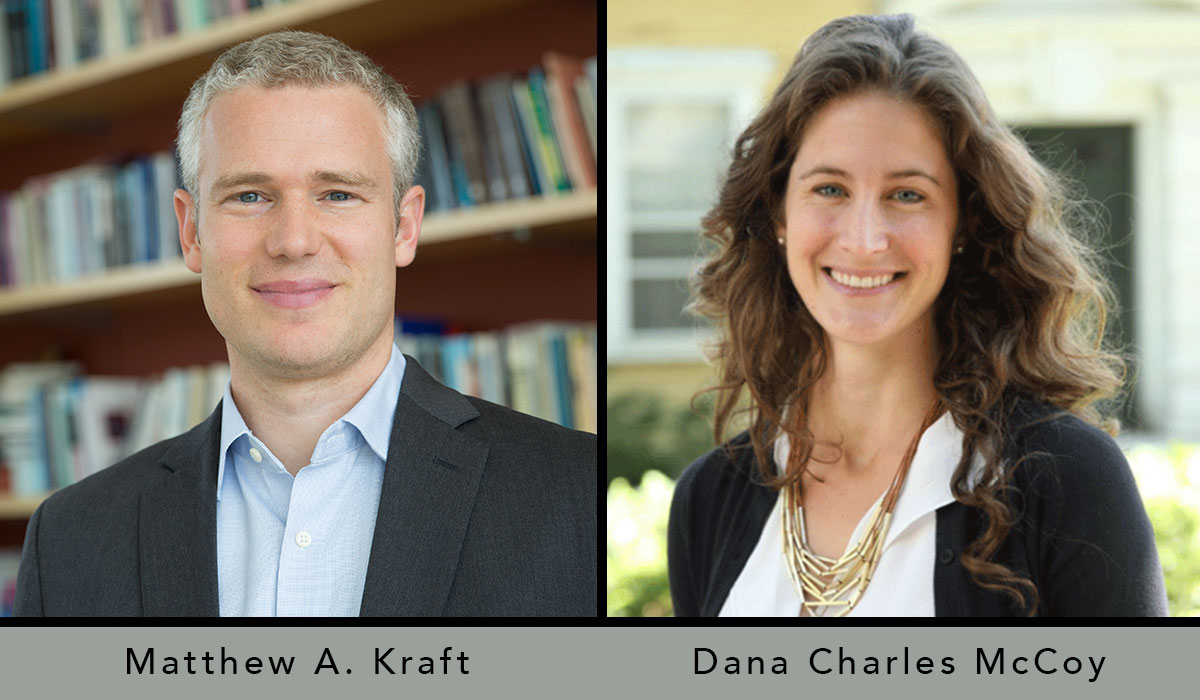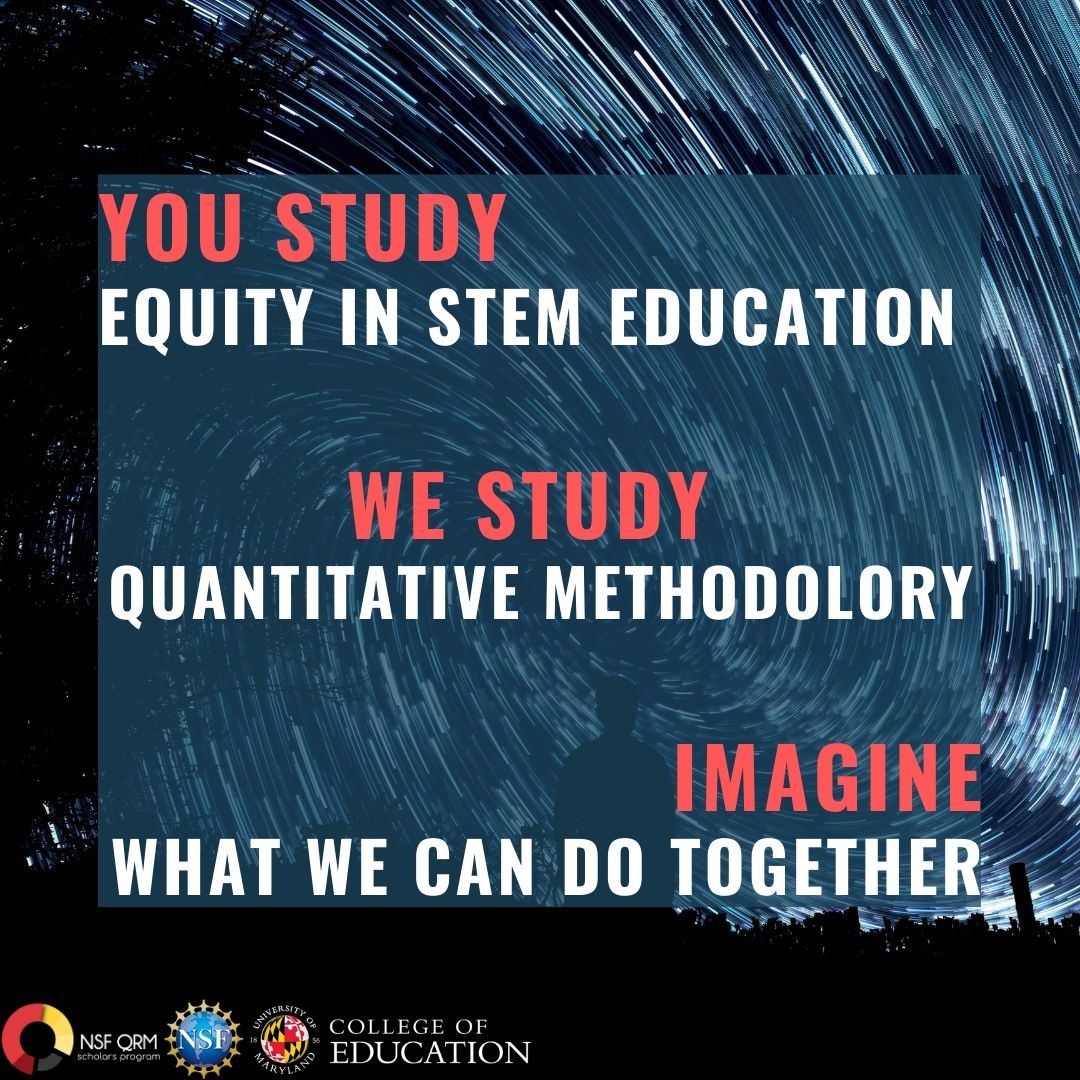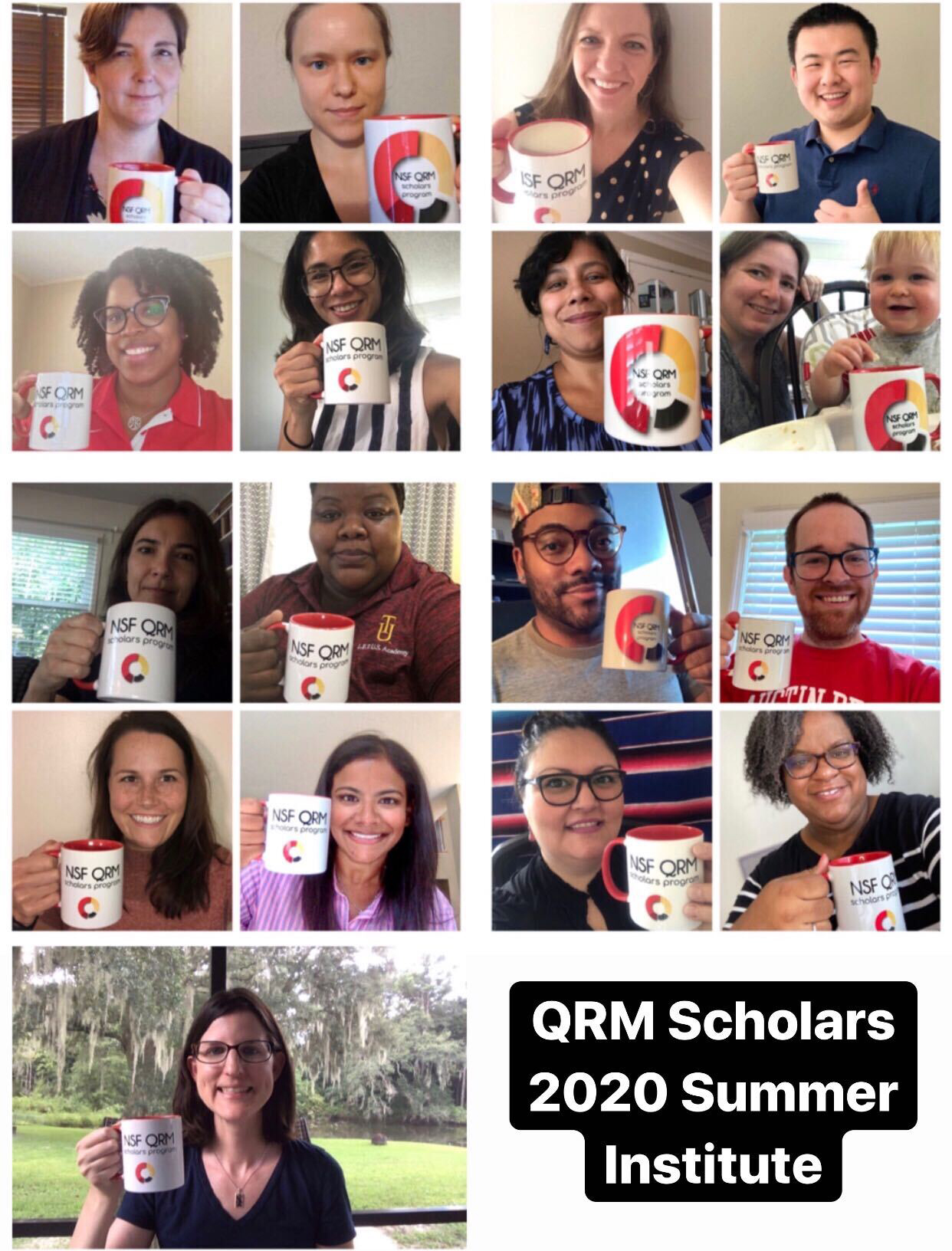
January-February 2021 Newsletter
In This Issue...
- Journal of Research on Educational Effectiveness Selects Sean Grant as Methodological Transparency Editor
- SREE Announces JREE 2020 Outstanding Article: Exploring the Impact of Student Teaching Apprenticeships on Student Achievement and Mentor Teachers
- SREE Announces Matthew Kraft and Dana McCoy as Recipients of the 2021 Early Career Award
- Call for Nominations - 2021 Hedges Lecture
- SREE 2021 Conference: September 26-29
- They’re Back! SREE Research Methods Webinars
- URE Webinar - Testing the Effectiveness of Strategies to Promote Research Use: Learning from Studies in Education and Mental Health Settings
- Institutional Member Corner: University of Maryland College of Education
- Institutional Member Corner: Michigan State University
- Thank you to SREE's 2021 Institutional Members
SREE's 2021 Virtual Convening, Examining Education Research through the 2020 Lens, started Monday and continues through March 5. Don't miss out - Register now!
Journal of Research on Educational Effectiveness Selects Sean Grant as Methodological Transparency Editor
 As JREE continues to emphasize the importance of research transparency, the editorial team is pleased to announce that Professor Sean Grant will be joining us as Methodological Transparency Editor. Sean has been actively involved in the open science movement for over a decade. Sean’s insights from ongoing work as Co-PI of the TRUST Initiative will benefit JREE in strategic decision-making and action plans related to open science. As JREE continues to emphasize the importance of research transparency, the editorial team is pleased to announce that Professor Sean Grant will be joining us as Methodological Transparency Editor. Sean has been actively involved in the open science movement for over a decade. Sean’s insights from ongoing work as Co-PI of the TRUST Initiative will benefit JREE in strategic decision-making and action plans related to open science.
“We are fortunate to have a nationally renowned expert on research transparency joining our team. Sean’s exceptional experience, expertise, and passion for open science positions us to be at the forefront of this movement aiming to further improve the quality of education research,” says JREE’s Editor-in-Chief, Michael Weiss.
In addition to Grant and Weiss, the JREE editors are Julie A. Edmunds, University of North Carolina - Greensboro, Stephanie M. Jones, Harvard University, and Fatih Unlu, RAND Corporation (Intervention, Evaluation, for Theory, Contexts, and Mechanisms), Beth Boulay, Abt Associates (Theory, Contexts, and Mechanisms), and Luke W. Miratrix, Harvard University (Methodology). The team is in their second year at the helm of JREE.
SREE Announces JREE 2020 Outstanding Article:
Exploring the Impact of Student Teaching Apprenticeships on Student Achievement and Mentor Teachers
 The Society for Research on Educational Effectiveness is pleased to announce the 2020 Journal of Research on Educational Effectiveness Outstanding Article Award goes to Dan Goldhaber, John M. Krieg, & Roddy Theobald for “Exploring the Impact of Student Teaching Apprenticeships on Student Achievement and Mentor Teachers.” The full article is available via open access, as is a one-page summary. JREE prides itself on publishing rigorous, relevant research on educational effectiveness – this research exemplifies that aspiration. The Society for Research on Educational Effectiveness is pleased to announce the 2020 Journal of Research on Educational Effectiveness Outstanding Article Award goes to Dan Goldhaber, John M. Krieg, & Roddy Theobald for “Exploring the Impact of Student Teaching Apprenticeships on Student Achievement and Mentor Teachers.” The full article is available via open access, as is a one-page summary. JREE prides itself on publishing rigorous, relevant research on educational effectiveness – this research exemplifies that aspiration.
This exemplary paper asks whether hosting a student teacher (or teaching apprentice, in this instance) has an impact. The authors capitalize on a unique longitudinal database of teacher apprentices, which they link to Washington State public school K-12 administrative records containing student- and teacher-level data. This allows for examining both same-year and longer-term impact on student achievement. The paper is clear, concise, and convincing in its description of why we should care about the impact (or lack thereof) of teaching apprenticeships on student performance. The research design and statistical analyses are sophisticated, carefully executed, and clear – including honest acknowledgment of key assumptions and sensible sensitivity analyses (necessary ingredients for a best-practices observational study).
The study results indicate “little evidence that hosting a student teacher helps or hurts student achievement during the year of student teaching, at least in grades 4-8 in math and reading. However, in subsequent years we find modest positive impacts on student math and reading achievement of having supervised a student teacher.” Connecting this to policy, the authors conclude that their findings should encourage schools and districts to host more student teachers. Congratulations to the authors on an important research product that can serve as a model for significance and rigor.
In recognition of their accomplishments, the authors will be honored during the SREE 2021 Conference to be held September 26-29 at the Renaissance Arlington Capital View Hotel in Arlington, Virginia.
SREE Announces Matthew Kraft and Dana McCoy as Recipients of the 2021 Early Career Award
 The Society for Research on Educational Effectiveness is pleased to announce the honorees of the 2021 SREE Early Career Award, which recognizes early career scholars whose work has advanced rigorous research relevant to educational practice: Matthew A. Kraft, Brown University and Dana McCoy, Harvard University. Kraft and McCoy were selected from a competitive pool of candidates. The Society for Research on Educational Effectiveness is pleased to announce the honorees of the 2021 SREE Early Career Award, which recognizes early career scholars whose work has advanced rigorous research relevant to educational practice: Matthew A. Kraft, Brown University and Dana McCoy, Harvard University. Kraft and McCoy were selected from a competitive pool of candidates.
Matthew Kraft received his Ed.D. in Quantitative Policy Analysis of Education from the Harvard Graduate School of Education and is an Associate Professor of Education & Economic at Brown University. His scholarship focuses on efforts to improve teacher and organizational effectiveness in K–12 public schools, and he has made a conscious effort to share his work beyond academic audiences. As summarized by his nominator:
Matt has become a leading national voice on education policy, particularly on issues related to K-12 teacher policy and on building capacity for the use of evidence to inform decisions making. Most notably, his research and public engagement has helped shape the national dialogue on how best to design and implement effective teacher evaluation systems. For example, his research has helped policymakers adopt a more nuanced understanding of “teacher quality” as multidimensional, dynamic (e.g., changing over time), and influenced by context. Beyond changing mindsets, he has been a leader in producing path breaking research that identifies how policymakers can best promote teacher improvement through coaching programs and building more supportive professional environments.
Dana Charles McCoy is an Associate Professor at the Harvard Graduate School of Education. She received her PhD in Psychology & Social Intervention with a concentration in quantitative analysis at New York University. Her scholarship is broadly focused on young children’s social and emotional development – with particular focus on self-regulation and executive function – in the context of poverty and other ecological risks. Her research is situated in low-income communities in the U.S. as well as internationally. As summarized by her nominator:
A hallmark of Dana’s work to date, and the primary area where she is leading, both from an intellectual and conceptual standpoint as well as a driver of the scholarship itself, has been in developing practical, empirically rigorous tools that capture young children’s development and early experiences in ecologically relevant ways. One tool stands out in particular: the Caregiver-Reported Early Development Instruments (CREDI), which was developed to enable global actors to move beyond gross proxy measures of early functioning (e.g., stunting, malnutrition, and percent living in poverty) and instead measure children’s actual skills based on caregiver reports in key developmental domains, such as language, motor skills, cognitive, and social-emotional…it is hard to overstate how critical a developmentally-informed and cross-culturally relevant tool is to that global endeavor. This is the first time in history that all 193 UN member nations have agreed to target early childhood development as a global outcome, a goal that would not be possible without the CREDI.
In recognition of their accomplishments, Kraft and McCoy will be recognized at the 2021 SREE Conference in September and also have the opportunity to organize a session for that meeting.
Call for Nominations - 2021 Hedges Lecture
The Hedges Lecture is a much-anticipated highlight of the yearly SREE conference. Offered by an individual who has made notable contributions to methods in education research, the lecture challenges the audience to think more critically, deeply, and expansively about the methods we use. The lecture bears the name of Larry Hedges to honor his work in advancing research methods in education and social science and his part in founding the Society, which supports continuous improvement in the field.
The SREE board of directors is requesting nominations for the 2021 Hedges Lecturer. In making your nomination, please consider the individual's:
-
Contributions to advancing research methods in education;
-
Potential for offering an engaging, thought-provoking lecture; and
-
Involvement with SREE.
Please submit your nomination here. You will be asked to provide the name of your nominee, why they deserve this honor, and why you think they would give an engaging lecture. The deadline is April 1, 2021.
SREE 2021 Conference: September 26-29 in Arlington, VA
The Fierce Urgency of Knowledge: Education Evidence for Reimagining and Reckoning
Abstract Submission
SREE is accepting abstracts for the September 2021 conference. The deadline to submit is April 15, 2021. Currently, the organization is planning to host an in-person conference with virtual presentation and attendance options.
Meet the SREE 2021 Conference Section Chairs
SREE 2021 Conference Program Co-Chairs Henry May, University of Delaware and Atnre Alleyne, TeenSHARP, have put together a great team of section chairs for the 2021 Conference:
- Early Childhood Education: Dale Farran, Vanderbilt University
- Postsecondary Education: Francisco (Paco) Martorell, University of California - Davis
- Education in Global Contexts: Gianluca Argentin, University of Milan - Bicocca
- Academic Learning in Education Settings: Jason Snipes, WestEd
- Social and Emotional Learning in Educational Settings: Laura Hamilton, Educational Testing Service
- Teachers and School Leaders: David Blazar, University of Maryland - College Park
- Organization of Schools and Systems: Elaine Allensworth, UChicago Consortium
- Use of Research Evidence across Settings: Kimberly DuMont, American Institutes for Research
- Research Methods: D. Betsy McCoach, University of Connecticut
The section chairs will be leading the review for their respective sections and are looking forward to seeing all the great work the SREE community is doing through your abstract submissions!
They’re Back! SREE Research Methods Webinars
Based on the popularity of the two research methods webinars SREE offered during the summer of 2020, we are pleased to be offering them again starting in March. We have three currently scheduled for the spring and will be adding more later in the year. Register for one, two, or all three and learn something you can put to use in your work immediately. Webinar registration rates are $25 for regular members and $50 for nonmembers. SREE student members receive complimentary access.
Registration is open for the March 15 webinar. Mark your calendars for the others and keep an eye on your inbox for registration notifications!
March 15, Noon-1:30 PM EDT
Designing and Reporting Your Study to Facilitate Evidence Clearinghouse Reviews and Meta-Analysis
Presenter: Sandra Davis, Abt Associates
April 20, Noon-1:30 PM EDT
Difference-In-Differences and Related Designs for Policy Evaluation in Education Research
Presenter: Avi Feller, University of California - Berkeley
May 18, Noon-1:30 PM EDT
Data Collection Methods for Cost-Effectiveness Analysis of Educational Interventions
Presenters: Rebecca Davis, University of Pennsylvania and Viviana Rodriguez, Columbia University
March 5 URE Webinar - Testing the Effectiveness of Strategies to Promote Research Use: Learning from Studies in Education and Mental Health Settings
Speakers: Kimberly Becker, University of South Carolina, Bruce Chorpita, University of California - Los Angeles, Aubyn Stahmer, University of California - Davis
Discussant: Adam Gamoran, William T. Grant Foundation
Join us for this second webinar in a series focused on the use of research evidence in education. During this moderated discussion, two research teams will describe their studies that rigorously test the effectiveness of strategies for promoting research use in mental health and education settings.
This session is being offered as part of SREE's Virtual Convening: Examining Education Research through the 2020 Lens. If you are not registered to attend the full convening but would like to attend this session, you can do so at no charge thanks to funding from the William T. Grant Foundation. Please register here.
Institutional Member Corner: University of Maryland College of Education

The College of Education at the University of Maryland, College Park, is excited to announce that applications are open for the 2021-22 cohort of the NSF QRM Scholars Program, a quantitative training institute for STEM education researchers focused on equity and inclusion. Members of the 2020-21 cohort had this to say about their experience:

The Program pairs early-career STEM education researchers with quantitative mentors to help researchers develop their skills in design, measurement, and analysis. Accepted Scholars will receive the following throughout their cohort year:
-
a one-week intensive Summer Institute on fundamental quantitative methodology;
-
interactive, live-stream quantitative training workshops;
-
quantitative expertise through ongoing interaction with the assigned mentor; and
-
access to a state-of-the-art statistical computation and software server.
The Program’s quantitative mentors include experts on Bayesian methods, causal inference and evaluation, factor analysis, item response theory, longitudinal data analysis, latent class analysis and mixture modeling, machine learning, questionnaire design, secondary data analysis, social network analysis, and structural equation modeling. The quantitative mentors are joined by experts in mentorship and STEM education to help Scholars navigate the Program.
Learn more about the program and apply now.
Institutional Member Corner: Michigan State University
CREATE for STEM Director Receives National McGraw Prize
Michigan State University Lappan-Phillips Professor of Science Education Joseph Krajcik recently received the 2020 Harold W. McGraw, Jr. Prize in Education for his global impact on preK-12 science teaching. Krajcik, has partnered with science teachers around the world to reform student engagement through the design, development and testing of project-based learning environments. Krajcik directs the CREATE for STEM Institute, an interdisciplinary research center at MSU that seeks to improve teaching and learning of science and mathematics through innovation and research. Learn more.
MITTENSS Fellowship Program Gets Underway
The Michigan State Interdisciplinary Training in Education and Social Science (MITTENSS) Fellowship, funded by a $4 million grant from the U.S. Department of Education’s Institute of Education Sciences, is in the process of selecting its first and second cohorts of fellows. The program expects to have about 14 doctoral students starting in 2021-22 and 2022-23. MITTENSS is for doctoral students interested in the intersection of education policy evaluation and implementation, and social science research. Fellows receive full tuition, stipends, research support, and apprenticeships with MSU researchers and education practitioners. Recruitment for the third cohort will begin in summer of 2021. Visit the fellowship website for more information.
Thank you to our 2021 Institutional Members
Thank you to the institutional members that have renewed early in 2021; SREE is grateful for your support of the education research community.
Abt Associates
American Institutes for Research
Decision Information Resources, Inc.
Educational Testing Service*
Insight Policy Research, Inc.
Marzano Research*
Michigan State University
MDRC
RAND - American Educator Panels
SRI International*
Stanford University
STEPP Center, Northwestern University
University of Maryland College of Education
Wallace Foundation
Westat
*We’d like to give a special welcome to these first-time institutional members!
Do you want to see your organization on this list? Learn more about institutional membership.
|